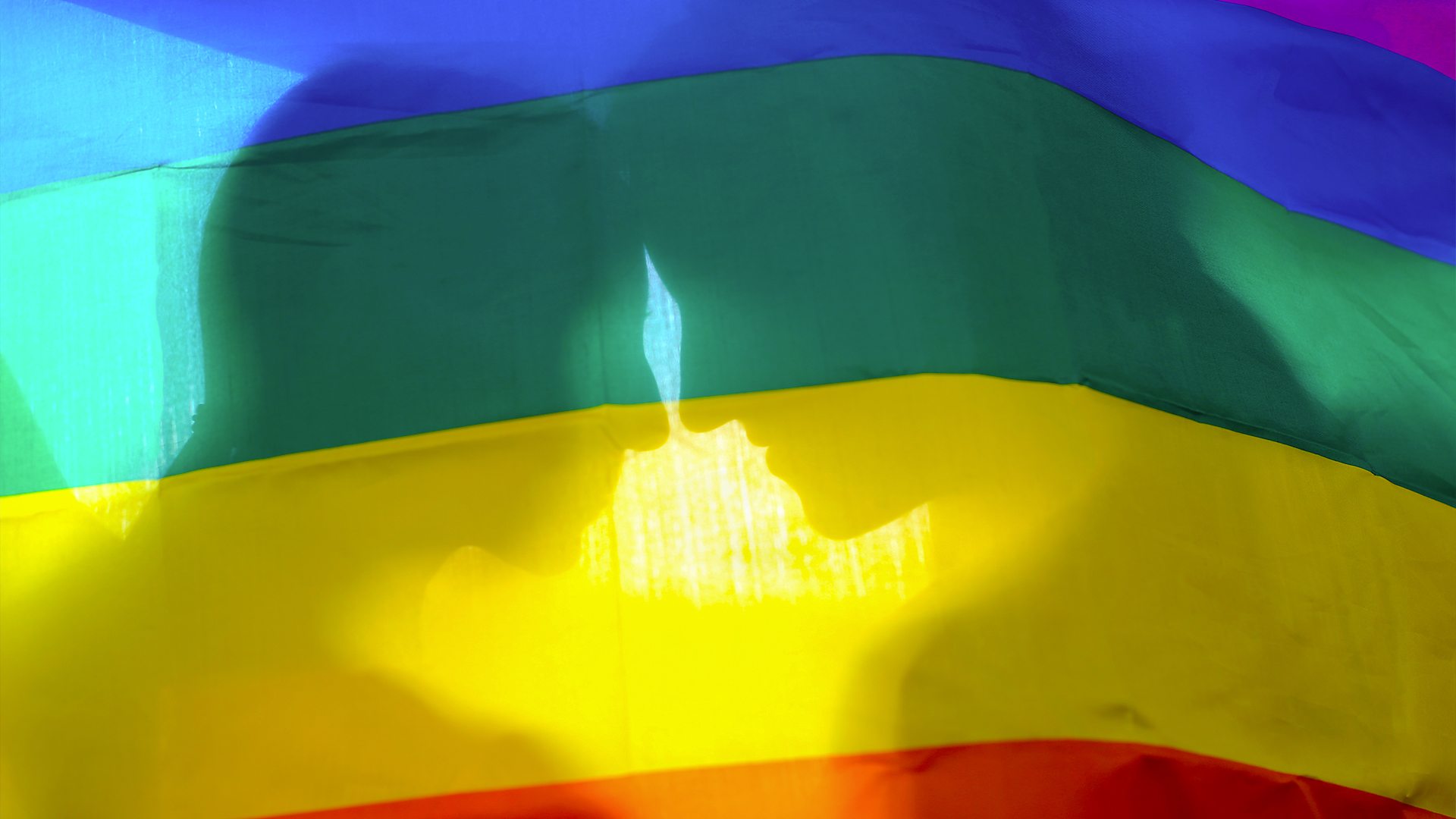Section 28: What was it and how did it affect LGBT+ people?

- Published
The law existed from 1988 - 2003 and affected LGBT+ people. Here's what you need to know about it
*Warning: This article contains a reference to a homophobic slur that you may find offensive*
Craig was bullied a lot in secondary school because he was gay. "There was only one member of staff who ever spoke to me about it, my drama teacher," he says. "And I wasn't aware at the time that she could have gotten into trouble just for doing that."
Craig, who grew up near Aberdeen, is one of the many LGBT+ people who came of age during the era of , a law passed in 1988 by a Conservative government that stopped councils and schools "promoting the teaching of the acceptability of homosexuality as a pretended family relationship."
You may have heard the term Section 28 this week when it was discussed on RuPaul's Drag Race UK.
"School was hard," contestant Divina De Campo explained, before breaking into tears in yesterday's episode of the reality show. "I got a lot of flak from pretty much everybody in the school. Growing up for everybody was hard but then you add on being gay and it was just a whole other level, particularly for the time that I grew up in.
"Kids in the playground pushing and shoving and calling you a 'fag'. Throwing their drinks on you. Because of Section 28 it meant that a lot of teachers felt like they couldn't step in."
Celebrities including Drag Race UK judge Graham Norton (second right, in the baseball cap) protesting against Section 28 at London Pride in 1998
What was Section 28?
‚ÄĘ Section 28 of the Local Government Act was enacted in May 1988
‚ÄĘ It was brought in to "prohibit by local authorities"
‚ÄĘ That's local councils - the organisations responsible for things like social care, rubbish collection and schools
‚ÄĘ The law was partly inspired by a 1983 story book called , which aimed to give children information about different types of family relationships
‚ÄĘ Tory Prime Minister said at the time: "Children who need to be taught to respect traditional moral values are being taught that they have an inalienable right to be gay. All of those children are being cheated of a sound start in life."
‚ÄĘ There were mass protests by LGBT+ campaigners
‚ÄĘ The law was stopped in Scotland in 2000 and in the rest of the United Kingdom
‚ÄĘ Thirty years after the law was made, Baroness Knight - the woman largely responsible for introducing it - said she was sorry if the law hurt anyone and that her intention had been the "wellbeing of children"¬†
Allow Twitter content?
This article contains content provided by Twitter. We ask for your permission before anything is loaded, as they may be using cookies and other technologies. You may want to read and before accepting. To view this content choose ‚Äėaccept and continue‚Äô.
'Bullying was school-wide'
Drag performer Divina De Campo, 35, grew up in Brighouse, West Yorkshire, and remembers teachers being afraid to talk about LGBT+ issues: "The teachers felt like they couldn't talk about it. Nothing was said about gay people at all."
Divina De Campo (right) explains Section 28 to younger contestant Blu Hydrangea
Divina, who is gay and , says her school didn't provide enough support - despite the isolation and homophobic bullying she suffered during her school years.
"For me, the bullying was school-wide. It wasn't just a select group of kids. School was a very difficult experience for me."
And Divina thinks the homophobic abuse she suffered at school still leaves its mark today.
"I'm constantly worried that people don't like me or that they're making fun of me. And I always carry with me the idea that I'm not good enough, that there’s something wrong with me."
'Being gay was something to be ashamed of'
Craig, now a teacher, was bullied in high school for being gay
Craig, 35, agrees that the lack of information he received about LGBT+ issues in school affected his later life.
"I was bullied from a young age," he says. "And there was a lot of isolation. The boys noticed I was different.
"I was made very aware that I was not like them. I became very insecure and quite quiet."
Craig, who went to school in north east Scotland and now teaches English at a school in east London, adds: "Section 28 put me at a lot of risk because I didn't get sex education that was relevant to me. I didn't get any advice about what a healthy relationship looked like. I had no models.
"As soon as I turned 16 and I started going out to gay clubs, I developed worrying behaviour that put me in danger, like excessive alcohol abuse and sex with much older men.
"I now know, as a teacher, that we have a duty of care over young people to educate them. No-one stepped in to help me back then and I feel a bit angry about that to this day."
Craig, who came out to a friend when he was 14, adds: "Section 28 led to so many insecurities around how I looked, how I behaved, how I carried myself. I became very paranoid about how people perceived me.
"Growing up I didn't know what it meant to be gay. I just knew that it was wrong. It was something to be ashamed of."
But he thinks things have now improved. For example, he is responsible for LGBT+ history month at his school and his pupils have had visits from the actor , who campaigned against Section 28 in the 1980s.
Craig says: "I want the children I teach to have a better education than I had."
If you or someone you know is struggling with issues raised by this story, find support through the ≥…»ň¬ŘŐ≥ Action Line.